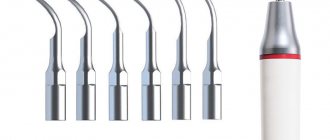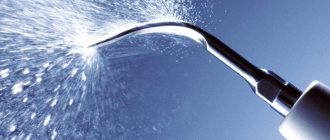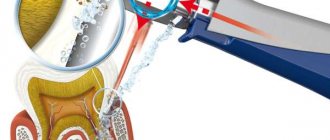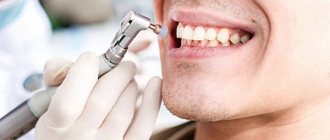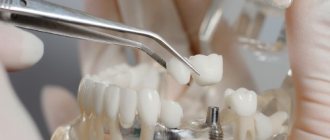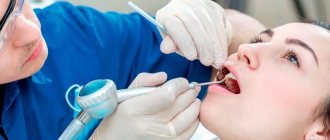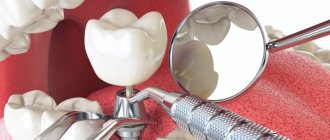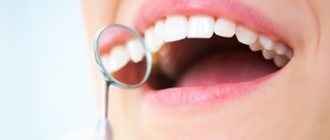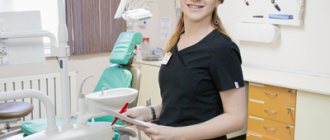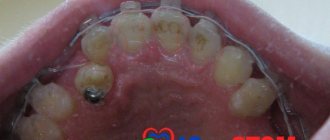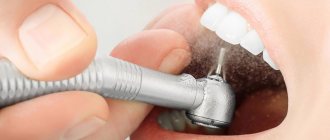The health of the dentition directly depends on the quality of care. The main prevention of oral diseases is regular cleaning. It is necessary to use toothbrushes, pastes, and floss daily. But home treatments are not enough for quality care. They do not allow you to remove hardened plaque and tartar. In modern dentistry, several methods are used to cleanse enamel. The Zuub Clinic offers its clients the safest and most effective technology.
Ultrasonic teeth cleaning allows you to qualitatively eliminate all formations, without harming the enamel, and acts as a preventive measure for major oral diseases.
What is ultrasonic teeth cleaning
The usual soft plaque that forms in the dentition can be easily removed with a brush or floss. But the formations harden over time and turn into stone. It is impossible to remove it with a brush. It is not possible to qualitatively remove plaque that contains components of tobacco smoke, coloring pigments of tea and coffee drinks. The use of chemicals creates a risk of damaging the enamel structure. This procedure is especially dangerous in case of increased sensitivity.
Ultrasonic cleaning uses a special device to remove plaque. Skyler creates an ultrasonic wave. Its length and frequency are selected by a qualified specialist for the patient personally, taking into account the condition of the enamel. Therefore, ultrasonic teeth cleaning is absolutely safe.
The wave, passing through a layer of plaque and stone, destroys their structure and forces it to separate from the surface of the teeth. After this treatment, formations are easily removed from the enamel. The wave penetrates into the interdental and subgingival spaces, fissures, and any hard-to-reach places. This ensures high quality processing.
Can I have my teeth with braces cleaned at Dial-Dent if I am undergoing treatment in another clinic?
We accept all patients, no matter whether they undergo orthodontic treatment at Dial-Dent, in another clinic, or with a private specialist. Teeth should be clean and healthy! It's the most important!
There are advantages for patients of the Dial-Dent orthodontic department.
- You can combine a visit to the orthodontist (scheduled visit) and professional dental hygiene without wasting time visiting different clinics.
- If there is severe plaque buildup, the orthodontist may remove the wire from the bracket system before cleaning. After dental hygiene, the arch is installed in place. Since cleaning does not last long, orthodontic treatment is not interrupted. Removing the wires allows you to better clean all elements of the braces system, as well as the teeth around the braces and along the gums.
In any case, the teeth will be cleaned to the highest possible quality, just the time spent on brushing will differ.
How often should you brush your teeth?
Ultrasonic teeth cleaning is an excellent preventive procedure that allows you to maintain their health and beauty and prevent diseases. The wave not only destroys tartar and plaque. It destroys pathogenic bacteria, eliminating the risk of creating a source of inflammation. During the procedure, pigment spots and layers of dyes are eliminated. Teeth become 1-2 shades lighter, which makes your smile more attractive.
The frequency of professional treatment depends on individual characteristics. Each person develops tartar at a different rate. Ultrasonic teeth cleaning is a safe procedure and can be performed from one to 4 times a year.
Cleaning the enamel is part of the preparation for dental implantation and prosthetics. Sometimes ultrasound treatment is required to process canals when installing a complex filling to ensure reliable fixation. In such cases, the procedure is prescribed by a specialist.
Why do I need to have an examination and x-ray at my first visit?
Being one of the best dentistry in Krasnodar with more than 14 years of experience, Smile Clinic has developed its own principles to provide the best dental care to our patients. From the moment you enter our dental office, we take responsibility for your well-being. However, without x-ray vision, neither our hygienists nor our doctors can guarantee the health of your teeth. An old filling that appears healthy may have internal decay that cannot always be detected just by looking at the tooth. Periapical pathology that forms at the tip of a tooth root that may have been injured during a catch (or other contact game) cannot be diagnosed and will not be discovered until the nerve is dead, in which case you may end up root canal treatment or, even worse, removal of such a tooth.
Price
The cost of ultrasonic teeth cleaning is determined individually; it depends on several factors:
- state of the dentition;
- availability of additional procedures;
- clinic categories.
If a dentist has to remove plaque and stones from all teeth, the cost of the procedure will be quite high. A patient who regularly undergoes professional treatment will not have to spend a lot of money.
After eliminating the formations, a number of additional procedures can be carried out: polishing, fluoridation, the cost of which is included in the total amount.
In high-category clinics, the price of cleaning is usually higher, since they employ highly qualified specialists and use effective drugs.
Indications for the procedure
It is recommended to have professional teeth cleaning for preventive purposes, even if nothing bothers you and your teeth visually look healthy. Typically, this procedure is performed during an annual visit to the dental clinic. It is also indicated if you are undergoing dental treatment. We are talking not only about installing fillings, but also about dental prosthetics or orthodontic treatment.
As for the frequency of visiting the dentist for professional cleaning, everything is individual. For most people, it will be enough to do this procedure 1-2 times a year. But sometimes there is an increased accumulation of plaque and, as a result, rapid formation of tartar. In this case, it is recommended to carry out cleaning every 3-4 months. This is especially important if you have gum problems. Also, more frequent cleaning is necessary for people who smoke, because cigarette smoke not only turns teeth yellow, but also contributes to the appearance of plaque on them. This rule also applies to patients who abuse wine, coffee and other products containing a high concentration of pigments that stain the enamel.
Teeth brushing technology
The duration of the procedure depends on the amount of work. On average, ultrasonic teeth cleaning takes 40-50 minutes. The procedure includes the following steps:
- examination of the oral cavity, assessment of the condition of the enamel, selection of wavelength and frequency;
- distribution of a special preparation on the surface of the teeth;
- ultrasound treatment;
- polishing
The procedure does not cause pain or discomfort, and no anesthetic drugs are used.
Our clinic employs qualified specialists with extensive practical experience. They will accurately assess the condition of the enamel and correctly select a safe operating mode. A special gel is applied to the enamel to increase the effectiveness of the wave. With its help, tartar, thick plaque, and age spots can be eliminated faster.
Special pastes are used to polish teeth after brushing. The procedure allows you to give the enamel ideal smoothness, eliminate unevenness and microcracks. This will prevent the formation of plaque on the teeth and prevent its accumulation for a long time. If the enamel is weakened, fluoridation is performed to strengthen its structure.
What to expect during a hygiene visit?
During your initial examination and dental cleaning, our hygienist will review and evaluate your medical history to determine if there are any medical conditions that may affect your treatment.
At each subsequent visit, the Doctor will evaluate your oral health and note any changes. Each new patient visit begins with our specialists performing x-rays. If you are pregnant or have a medical condition that prevents you from having an x-ray, please note this in your medical record. If you have had an x-ray within the last 12 months, please send it to our dental clinic by email
or bring the study disc with you. Our goal is not to take an x-ray, but to have diagnostic material so that we can provide you, our patients, with a comprehensive dental examination and draw up a comprehensive treatment plan. The doctor will screen for oral cancer and oral lesions, and also test for oral symptoms of other serious diseases, including heart disease, cancer and diabetes. One of our dentists will conduct an examination of your dentition (dental examination) to look for possible new and recurring cavities. If one is found, conditions and treatment options will be explained to you. During a periodontal examination, your gums will be assessed for signs of gum disease by measuring the periodontal pockets with a probe. Our hygienists are trained and certified to administer local anesthesia to relieve discomfort during treatment, although this is rarely required as they have a very light hand and therefore a very gentle touch. As a rule, the simple use of desensitizers provides comfortable tooth brushing. At the end of your visit, the dental hygienist will teach, review, and reinforce proper oral hygiene techniques, including effective brushing and flossing. Our patients prefer to be treated by the same dentist. Regarding hygiene appointments, we support the same. Having the same professionals working with you regularly develops mutual understanding and continuity of dental care and knowledge of the individual needs of each patient.
How harmful is brushing your teeth?
Ultrasonic teeth cleaning belongs to the category of safe, gentle techniques that do not harm the enamel or the body. But before carrying out the procedure, consultation with a specialist is necessary, as there are certain contraindications. Processing cannot be carried out if:
- arrhythmias;
- ARVI;
- hepatitis, HIV, tuberculosis;
- implants, orthopedic structures;
- high enamel sensitivity.
This procedure is not performed on children and adolescents whose bite formation has not yet completed.
Contraindications
Professional teeth cleaning is a safe procedure. However, it also has its contraindications. First of all, they concern the health of teeth and oral cavity. Thus, cleaning is not recommended if the patient is diagnosed with erosion of tooth enamel or has very high tooth sensitivity. The procedure is also contraindicated in cases where there are inflammatory diseases of the gums or other tissues of the oral cavity in the acute phase. However, it can be done immediately after the pathological process has been eliminated.
It is not recommended to perform professional hygiene if a person has an infectious disease or any other pathology in the acute stage. In this case, you first need to undergo treatment, and only then seek help from a dentist.
Brush your teeth after eating and drinking
This is the basis of the basics, the main rule of the orthodontist patient. You don't have to brush your teeth except after drinking water. If you have 3 main meals and 2 snacks during the day, then there should be 5 brushes and pastes. Only in this case will it be possible to wear braces or aligners for 12–15 months without harming your teeth.
Most of the food remains in the braces, and among all the systems, the most inconvenient in this sense are ligature ones. The arch is attached with rubber bands (ligatures), because of this, the braces themselves occupy a large surface of the tooth, food gets under the arch and under the ligatures.
Modern non-ligature braces are more convenient. They are small in size, their clasps into which the arc is attached are smooth, so large pieces of food usually do not get stuck in them. But you still need to brush your teeth constantly.
And removable aligners do not affect the nutrition process at all. The main thing is not to leave them wrapped in a napkin while eating (this can cause them to break). But with this system, you won’t be able to avoid brushing: after all, you need to put the aligners on your cleaned teeth immediately after eating.
What to do if you spend a lot of time away from home, at work or traveling? The solution is elixirs and other mouthwashes, disposable brushes with paste already applied to them. If you have absolutely nothing on hand, you can get by with rinsing with water. But this should not become a system.
Take time to cleanse in the evening
At work or at university, it is difficult to clean your teeth efficiently, so once or twice a day you need to do a thorough cleaning using brushes. Each brush must be placed under the arch and the interdental spaces and the space under the arch must be cleaned. But this is only relevant for those who wear braces.
To clean braces, a brush with a brush is useful; when treating aligners, a regular or electric brush is sufficient.
It’s easier with aligners: you can brush your teeth with an ultrasonic electric toothbrush. They often have a timer that measures the required 2 minutes. To make sure that your teeth are clean, you can use an elixir with the function of “revealing” plaque - as a rule, after such a rinse, you have to brush your teeth again.
For convenience and comfort, all orthodontic patients can have an irrigator at home - a device that cleans teeth with a thin stream of water under pressure. Water literally “knocks out” all the remaining food from hard-to-reach places and massages the gums, which is useful not only during orthodontic treatment, but in general always.
An irrigator helps keep your teeth perfectly clean
Don't forget to drink water
Pure water quenches thirst well, refreshes the oral cavity and does not contribute to the appearance of plaque, unlike tea and coffee. If the mucous membrane of the lips is sufficiently moisturized, it is not susceptible to drying out (especially in winter, when indoor air is dry), which means there is less risk that the orthodontic system will cause irritation.
All these rules are simple, and you get used to them within the first few days after starting treatment. Once adapted, they are easy to follow and do not interfere with your active life. In addition, the habit of brushing your teeth thoroughly remains, as a rule, for life, which also contributes to maintaining health.
More articles:
- Back to the orthodontist? All about re-treatment
- What hurts more: braces or aligners?
